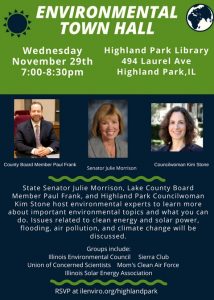Our planet is burning, literally. Fires in Alberta, Canada have been burning for weeks with more fires now in Quebec and Nova Scotia. These fires have affected air quality in much of the US, bringing record hazardous levels of pollution to the Eastern US and worsened air quality in Highland Park, too.
Climate change is causing higher temperatures, and more extreme weather across the globe. This is what scientists have long predicted would happen if we continued to release heat trapping gases into the atmosphere. Back in 1965, the American Petroleum Institute knew that the burning of fossil fuel would harm the environment:
“One of the most important predictions of the report is that carbon dioxide added to the earth’s atmosphere by burning of coal, oil, and natural gas at such a rate that by the year 2000 the heat balance will be so modified as possibly to cause marked changes in climate beyond local or even national efforts…” Frank Ikard, President, American Petroleum Institute (1965) As early as the 1970’s, scientists at Exxon Mobil predicted global temperature rise with shocking accuracy. Given the data, these companies could have sounded the alarm and changed their business models to transition to cleaner sources of energy. Royal Dutch Shell CEO Ben van Beurden said in 2021, “Yeah, we knew. Everybody knew… And somehow, we all ignored it.”
Yet they did not simply ignore it. According to an investigation by the Columbia University Journalism School:
“As many of the world’s major oil companies — including Exxon, Mobil and Shell — joined a multimillion-dollar industry effort to stave off new regulations to address climate change, they were quietly safeguarding billion-dollar infrastructure projects from rising sea levels, warming temperatures and increasing storm severity.
From the North Sea to the Canadian Arctic, the companies were raising the decks of offshore platforms, protecting pipelines from increasing coastal erosion, and designing helipads, pipelines and roads in a warming and buckling Arctic.”
In 1988, NASA Scientist James Hansen testified to Congress about climate change. Had we taken action then, we could have transitioned gradually away from fossil fuels, reducing air pollution at the same time. According to a 2021 Natural Resources Defense Fund report, “The staggering, often-overlooked financial costs to our health from fossil-fuel generated air pollution and climate change surpass $820 billion in health costs each year…”
I recently had the opportunity to hear Bill McKibben speak on climate change. While he was optimistic, he noted that it was not us, but physics that determines the time frame for action. The latest report from the Intergovernmental Panel on Climate Change (IPCC) is clear about the need for swift action: “Deep, rapid, and sustained reductions in greenhouse gas emissions would lead to a discernible slowdown in global warming within around two decades…” Scientists agree that we must cut our greenhouse gas emissions by half by 2030. That is just six and a half years from now.
As I write this, my electric car is charging with energy from solar panels. The Inflation Reduction Act, signed into law last year, provides incentives to increase the energy efficiency of your home and to install renewable energy. I hope you will take action to reduce climate change, at home and in the broader world.


 To those of us in the trenches, it may seem like we are not moving forward (I have been working on climate issues for 29 years!). However, there are some promising signs. In the past 24 hours, three states have said they will work towards the US commitments on climate in the absence of federal involvement. Thank you to California, Washington and New York! Carbon emissions may have
To those of us in the trenches, it may seem like we are not moving forward (I have been working on climate issues for 29 years!). However, there are some promising signs. In the past 24 hours, three states have said they will work towards the US commitments on climate in the absence of federal involvement. Thank you to California, Washington and New York! Carbon emissions may have